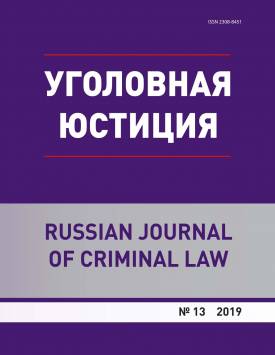False Accusation as a Way to Abuse the Subjective Right by the Accused
The article studies the right of the accused to testify, the limits of the realization of this right, as well as the limits of the permissible state intervention in the conduct of a participant in criminal proceedings. The relevance of the chosen topic is due to the common practice of giving a false testimony, of slander of a knowingly innocent person on the part of the accused. In this case, the accused uses the testimony to achieve their illegal interests and to detriment the objectives of the investigation and causes damage to third parties. In this regard, the following objectives are reached in the article: (1) the testimony of the accused is characterized; (2) the notion of a false accusation is defined; 3) false accusation as a way of abuse of the subjective right by the accused is characterized; (4) ways to respond to false accusation are determined. The methods of the study include general scientific and special scientific methods of cognition: dialectical, formal logical, comparative legal, systemic, analysis and synthesis. On the basis of these methods, the article indicates the specifics of the testimony of the accused, in contrast to the testimony of the victim and the witness. Firstly, the testimony of the accused is not only a source of evidence, but also a means of defense against the accusation. Secondly, the accused is the initial source of information about the circumstances of the crime imputed to them. The definition of false accusation is formulated as the testimony of the accused, falsely exposing another person to have committed a crime. The following signs of false accusation as a way of abuse of subjective right are noted: (1) the possibility of false accusation is conditioned by the right of the accused to testify; (2) the criminal procedure legislation does not contain a direct prohibition on this form of testifying; (3) false accusation is the realization of the right in contradiction with its purpose; (4) the intent of the person to exercise the right to testify in the form of slander; (5) the ability of a participant in a criminal proceeding to exercise the right granted to him/her in another legitimate way; (6) false accusation creates obstacles to the investigation of a crime, opposes the achievement of objective truth in the case. The result of the study is the formulation of how to respond to false accusation. The conclusion is made about the need to introduce a new crime. It is noted that for the accused a measure of criminal liability for false accusation will be their additional burden, including the case when they are subject to punishment for the "main" crime.
Keywords
обвиняемый, право на защиту, право на дачу показаний, оговор заведомо невиновного лица, злоупотребление субъективным правом, accused, right to defense, right to testify, false accusation, abuse of subjective rightAuthors
| Name | Organization | |
| Zheleva Olga V. | Tomsk State University | zheleva.olga@gmail.com |
References

False Accusation as a Way to Abuse the Subjective Right by the Accused | Ugolovnaya yustitsiya – Russian Journal of Criminal Law. 2019. № 13. DOI: 10.17223/23088451/13/13
